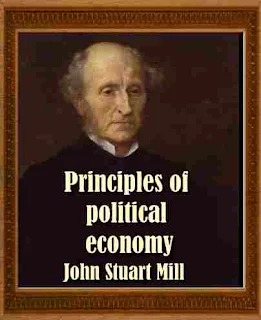Principles of political economy - John Stuart Mill
" With some of their applications to social philosophy." An epoch-mating work similar in its object and general conception to that of Adam Smith, but " adapted to the more extended knowledge and improved ideas of the present age."
Excerpt:
The appearance of a treatise like the present, on a subject on which so many works of merit already exist, may be thought to require some explanation. It might perhaps be sufficient to say, that no existing treatise on Political Economy contains the latest improvements which have been made in the theory of the subject.
Many new ideas, and new applications of ideas, have been elicited by the discussions of the last few years, especially those on Currency, on Foreign Trade, and on the important topics connected more or less intimately with Colonization: and there seems the reason that the field of Political Economy should be re-surveyed in its whole extent, if only for the purpose of incorporating the results of these speculations, and bringing them into harmony with the principles previously laid down by the best thinkers on the subject To supply, however, these deficiencies in former treatises bearing a similar title, is not the sole, or even the principal object which the author has in view.
The design of the book is different from that of any treatise on Political Economy which has been produced in England since the work of Adam Smith. The most characteristic quality of that work, and the one in which it most differs from some others which have equalled or even surpassed it as mere expositions of the general principles of the subject, is that it invariably associates the principles with their applications.
This of itself implies a much wider range of ideas and of topics that are included in political economy, considered as a branch of abstract speculation. For practical purposes, political economy is inseparably intertwined with many other branches of social philosophy. Except on matters of mere detail, there are perhaps no practical questions, even among those which approach nearest to the character of purely economical questions, which admit of being decided on economical premises alone.
And it is because Adam Smith never loses sight of this truth; because in his applications of Political Economy he perpetually appeals to other and often far larger considerations than pure Political Economy affords that he gives that well-grounded feeling of command over the principles of the subject for purposes of practice, owing to which the ' Wealth of Nations,' alone among treatises on Political Economy, has not only been popular with general readers but has impressed itself strongly on the minds of men of the world and of legislators.
It appears to the present writer, that a work similar in its object and general conception to that of Adam Smith, but adapted to the more extended knowledge and improved ideas of the present age, is the kind of contribution which Political Economy at present requires.
The ' Wealth of Nations ' is in many parts obsolete and in all imperfect. Political Economy, properly so-called, has grown up almost from infancy since the time of Adam Smith: and the philosophy of society, from which practically that eminent thinker never separated his more peculiar theme, though still in a very early stage of its progress, has advanced many steps beyond the point at which he left it.
No attempt, however, has yet been made to combine his practical mode of treating his subject with the increased knowledge since acquired of its theory or to exhibit the economical phenomena of society in the relation in which they stand to the best social ideas of the present time, as he did, with such admirable success, in reference to the philosophy of his country. Such is the idea which the writer of the present work has kept before him.
To succeed even partially in realizing it would be a sufficiently useful achievement to induce him to incur willingly all the chances of failure. It is requisite, however, to add, that although his object is practical, and, as far as the nature of the subject admits, popular, he has not attempted to purchase either of those advantages by the sacrifice of strict scientific reasoning. Though he desires that his treatise should be more than a mere exposition of the abstract doctrines of Political Economy, he is also desirous that such an exposition should be found in it.
Download Principles of political economy - 25.6 MB.


